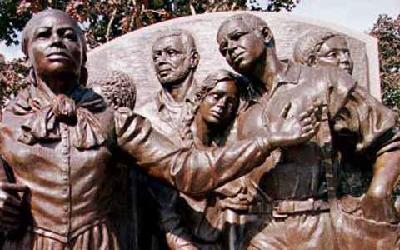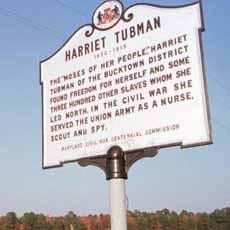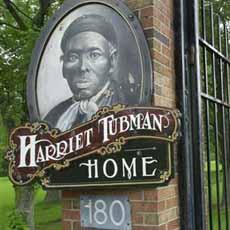
SHIRLEY GRIFFITH: I'm Shirley Griffith.
RAY FREEMAN: And I'm Ray Freeman with the Special English program PEOPLE IN AMERICA. Every week we tell the story of someone important in the history of the United States. Today we tell about Harriet Tubman, an African American woman who fought slavery and oppression.
(MUSIC)
SHIRLEY GRIFFITH: Historians say Harriet Tubman was born in the year 1820. Nobody really knows. In the United States in the 19th Century the birth of slaves was not recorded.
We do know that Harriet Tubman was one of the bravest women ever born in the United States. She helped hundreds of people escape from slavery on the Underground Railroad. This was a system that helped slaves escape from the South to states where slavery was banned.
Because of her work on the Underground Railroad, Harriet Tubman was called Moses. In the Bible, Moses was the leader of the Jewish people enslaved in Egypt. He brought his people out of slavery to the promised land. Harriet Tubman died in 1913. All her life, she always tried to improve life for African Americans.
(MUSIC)
RAY FREEMAN: From a very early age, Harriet knew how slaves suffered. Her parents were slaves. They belonged to Edward Brodas, a farmer in the middle Atlantic state of Maryland. Harriet's parents tried to protect her and their ten other children as much as they could. There was little they could do, however. Slaves were treated like animals. They could be sold at any time. Families often were separated. Slave children were not permitted to act like children. By the time Harriet was three years old, Mr. Brodas ordered her to carry notes from him to other farmers. Some of these farmers lived as far as 15 kilometers away. Harriet was punished if she stopped to rest or play.

SHIRLEY GRIFFITH: When Harriet was six years old, the Brodas family sent her to work for another family who lived near their farm. While there, Harriet was infected with the disease measles. Even though she was sick, she was forced to place and remove animal traps in an icy river. She was sent home when she became dangerously ill. Harriet's mother took very good care of her. The child survived. Then she was sent to work in the Brodas's house. Her owners never gave her enough to eat. One day she was working in the kitchen. She was looking at a piece of sugar in a silver container when Mrs. Brodas saw her. Harriet ran away in fear. She was caught and beaten very severely. Her owners decided that Harriet never would make a good worker in the house. She was sent to the fields.
RAY FREEMAN: Harriet's parents were sad. They worked in the fields and they knew how difficult it was to survive the hard work. But working outside made Harriet's body strong. And she began to learn things from the other slaves. These things one day would help her lead her people to freedom. Harriet heard about Nat Turner. He had led an unsuccessful rebellion of slaves. She heard about other slaves who had run away from their cruel owners. She was told that they had traveled by the Underground Railroad. They did not escape by using a special train. Instead of a real train, the Underground Railroad was a series of hiding places, usually in houses of people who opposed slavery. These were secret places that African Americans could stop at as they escaped from the South to the North. As Harriet heard stories of rebellion, she became more of a rebel.
(MUSIC)
SHIRLEY GRIFFITH: One day when Harriet was 15 she was at a local store. A slave owner entered and threatened a young boy who was his slave. At first, the slave refused to move. Then he ran for the door. Harriet moved in front of the young man. The slave owner reached for a heavy weight. He threw it at his slave. He missed. Instead, the heavy metal object hit Harriet in the head. Harriet almost died. Months passed before she could get out of bed. For the rest of her life, she carried the mark of a deep wound on her head. And she suffered from blackouts. She would suddenly lose consciousness as though she had fallen asleep.
RAY FREEMAN: Mr. Brodas felt he would never get any good work out of Harriet. So he decided to sell her. Harriet thought of a way to prevent this. Each time she was shown to someone who might buy her, she acted as if she were falling asleep. After a while, Mr. Brodas gave up hope of selling Harriet. He sent her back to the fields. She dreamed of freedom while picking vegetables and digging in the fields. In 1844, at about age 24, she married a free black man named John Tubman. By now, Harriet was sure she wanted to try to escape. It would be very dangerous. Slaves who were caught often were killed or almost beaten to death. Harriet knew she must wait for just the right time.

SHIRLEY GRIFFITH: Suddenly, in 1849, the time came. Mr. Brodas died. His slaves probably would be sold to cotton farmers further South. The situation there would be even worse. John Tubman tried to make Harriet forget about running away. He was free. Why should he make a dangerous trip with a woman breaking the law? Harriet decided that her marriage to John must end. Harriet heard that she was to be sold immediately. She knew she needed to tell her family that she was leaving. She began to sing, softly at first, then louder. She sang the words, "I'm sorry to leave you...I'm going to the promised land." Her family understood.
(MUSIC)
RAY FREEMAN: Harriet ran to the home of a white woman who had promised to help. This woman belonged to the Quakers, a religious group which hated slavery. The Quaker woman told her how to reach another home where she could hide. Harriet went from house to house that way on the Underground Railroad. Each place was a little closer to the eastern state of Pennsylvania. Slavery was banned there. Once she was hidden under hay that had been cut from the fields. Another time, she wore men's clothing. Finally, she crossed the border into Pennsylvania. Later, she told a friend, "I felt like I was in heaven."
SHIRLEY GRIFFITH: Now that Harriet was free, she did not forget the hundreds of other slaves back in Maryland. During the next ten years, she led a much expanded Underground Railroad. She freed her parents, her sister, brothers and other family members. She found a home for her parents in Auburn, New York.
Harriet traveled back and forth 18 times, helping about 300 slaves escape into free territory. She became an expert at hiding from slave hunters. At one time, anyone finding Harriet was promised 40,000 dollars for catching her -- dead or alive. The people she helped called her Moses. She had rescued them from slavery just as the biblical Moses rescued the Jews.
Harriet found another way to fight slavery after the Civil War began in 1861. Seven southern states decided to separate from the United States, mainly over the issue of slavery. The northern states refused to let the United States of America break apart.
After fighting began, Harriet Tubman went into enemy territory to spy for the North. She also served as a nurse. After four years of bloody fighting, the North won the war.
President Abraham Lincoln freed the slaves in 1863. There was no longer any need for Harriet to be Moses.
(MUSIC)
RAY FREEMAN: After the fighting ended, Harriet Tubman returned to Auburn, New York. She married a man named Nelson Davis. This could have been the beginning of a few quiet years of family life for her. But she kept working. She traveled and gave speeches to raise money for better education for black children. She also worked for women's rights and housing. And she sought help for old men and women who had been slaves. Harriet Tubman died in 1913. She was about 93 years old. By that time, she was recognized as an American hero. The United States government gave a funeral with military honors for the woman known as Moses.
(MUSIC)
SHIRLEY GRIFFITH:This program was written by Jeri Watson. I'm Shirley Griffith.
RAY FREEMAN: I'm Ray Freeman. Listen again next week at this time for another PEOPLE IN AMERICA program on the Voice of America.
measles: an infectious disease, especially of children, that causes fever and small red spots that cover the whole body 麻疹
James Rouse, 1914-1996: he built Columbia, Maryland, a planned city near Washington, DC
Dian Fossey, 1932-1985: she worked to protect the mountain gorillas of central Africa
Patsy Cline, 1932-1963: fans were 'crazy' about this young country music star
People in America - Bob Feller, 1918-2010: One of baseball's finest pitchers
(來源:VOA 編輯:崔旭燕)
